--Amjad Shavita, managing co-director of Sikkuy - The Association for the Advancement of Civic Equality, wrote in an Op-Ed, why he no longer walks his daughter to kindergarten.*
You Must Be Kidding:
“We are in luck that the Arabs boycotted the opening ceremony of the 22nd Knesset. They would have shot into the air to express happiness/sadness/their protest/ because that's their habit, and then, of course, blame the police."
--Far-right-wing, racist religious settler Transportation Minister, Bezalel Smotrich, wrote on Twitter, after the Arab MKs boycotted the ceremony as a gesture of protest against the violent crime in Arab society, which they call on the government to eliminate.*
Quote of the Day #2:
“I’m surprised the racist [Smotrich] didn't take our seats and claim God told him they are his."
--Ayman Odeh, leader of the Joint List, responded, noting Smotrich’s Messianic settler ideology.*
Front Page:

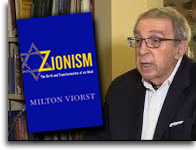 Since I began covering Israel and its Middle East neighbors in
the wake of the Six-Day War of 1967, it has been apparent to me that an enduring peace is possible only after
Jews and Arabs reach a point of mutual respect and understanding. This objective has over the ensuing years has
proven extremely elusive. Both societies have staked territorial claims that leave little room for the
interests of the other. Both overlook the fact that history does not stand still, not in the Middle East or
anywhere else, and that territorial claims are not sacred. If Jews and Arabs do not respond to changing
conditions, and embrace a vision of social justice, both surely risk destruction. Peace Now -- Shalom
Achshav in Hebrew -- has recognized that truth since its founding thirty-five years ago. As a Zionist,
dedicated to the ideal of a homeland for the Jewish people, I applaud the struggle that Peace Now wages for the
well-being of the two peoples who live in Palestine.
Since I began covering Israel and its Middle East neighbors in
the wake of the Six-Day War of 1967, it has been apparent to me that an enduring peace is possible only after
Jews and Arabs reach a point of mutual respect and understanding. This objective has over the ensuing years has
proven extremely elusive. Both societies have staked territorial claims that leave little room for the
interests of the other. Both overlook the fact that history does not stand still, not in the Middle East or
anywhere else, and that territorial claims are not sacred. If Jews and Arabs do not respond to changing
conditions, and embrace a vision of social justice, both surely risk destruction. Peace Now -- Shalom
Achshav in Hebrew -- has recognized that truth since its founding thirty-five years ago. As a Zionist,
dedicated to the ideal of a homeland for the Jewish people, I applaud the struggle that Peace Now wages for the
well-being of the two peoples who live in Palestine.





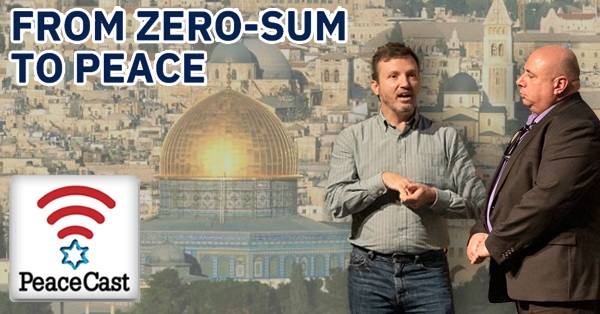
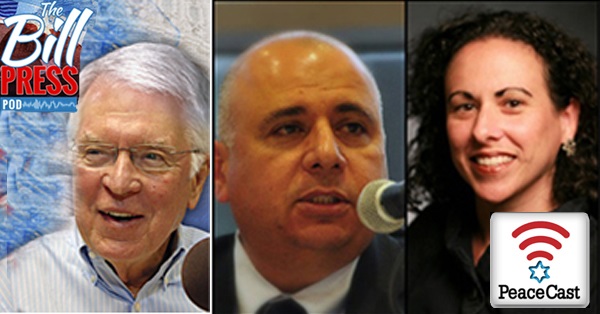
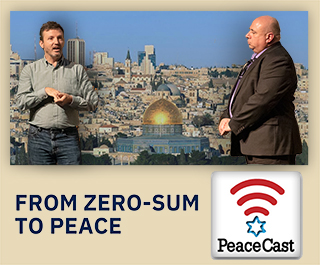 This episode of APN's podcast features a presentation that Nizar
Farsakh and Ori Nir gave at Ithaca College on September 17th. The talk was an attempt to make the
Israeli-Palestinian conflict more accessible to young people by weaving personal narratives of an
Israeli-American and a Palestinian-American into the collective national narratives of Israelis and
Palestinians.
This episode of APN's podcast features a presentation that Nizar
Farsakh and Ori Nir gave at Ithaca College on September 17th. The talk was an attempt to make the
Israeli-Palestinian conflict more accessible to young people by weaving personal narratives of an
Israeli-American and a Palestinian-American into the collective national narratives of Israelis and
Palestinians.
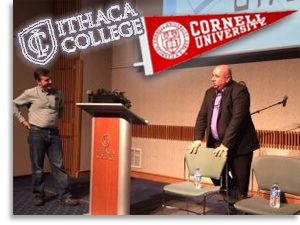 On September 17th, Ori Nir participated in two
special events at Cornell University and Ithaca College together with Nizar Farsakh, the chair of the Board of
the Museum of the Palestinian People in Washington DC.
On September 17th, Ori Nir participated in two
special events at Cornell University and Ithaca College together with Nizar Farsakh, the chair of the Board of
the Museum of the Palestinian People in Washington DC.